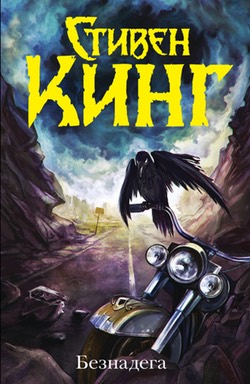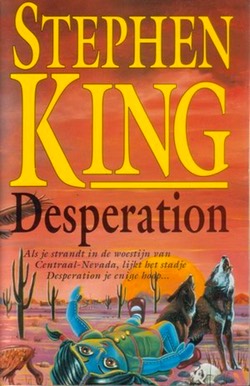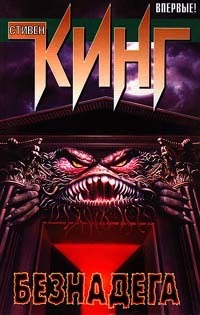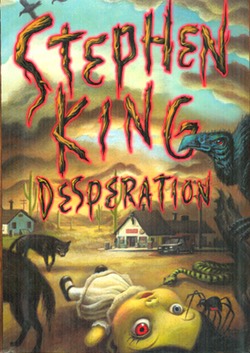When you think about it, the whole thing makes sense. After all, the Bible is full of mutilation, torture, murder, sex crimes, and just plain old perversity. But the idea is an uncomfortable one. And yet, after reading Stephen King’s Desperation, you have to admit that one of the most profound Christian novels of the second half of the 20th century involves a crazed cop ranting about Jews and blowjobs, cougar vs. man combat, a live buzzard having its wings torn off, and a man ripping out his own tongue. Stephen King, everybody!
“The other thing that’s interested me ever since I was a kid was the idea that’s baldly articulated in Desperation, and that is that God is cruel,” King said in an interview with Salon, and there is cruelty galore in this book. There’s also a whole lot of God, from the opening line “Oh! Oh, Jesus! Gross!” to the final sentence which reads, “David put his head back against the seat, closed his eyes, and began to pray.” What changed between 1985, when King was hopped up on coke, writing “The Mist” with its shrill Christian lynch mob, and 1994 when he wrote Desperation with its no-nonsense God who’s a source of quiet strength? Looking at his bio it’s pretty obvious: he got sober. Because the God of Desperation is the God of AA.
In 1991, Stephen King was driving his daughter, Naomi’s, car across Nevada when he passed through the town of Ruth. The streets were empty, and a voice inside his head said, “They’re all dead…who killed them? The sheriff killed them all.” Cut to September, 1994, and King hopped on his Harley and did a 10-city tour of independent bookstores in support of his new novel Insomnia. Immediately afterwards, on November 1, he sat down and wrote Desperation. Halfway through, he got an idea for another book about guns, toys, and suburbia, and decided to write The Regulators using the characters from Desperation, and publish both books simultaneously on September 24, 1996. They premiered at number one and two on the New York Times bestseller list, and remained on the list for about fifteen weeks.
 In Desperation, a huge cast of nine characters traveling separately across Nevada get imprisoned in the tiny mining town of Desperation by a sheriff named Collie Entragian who is swelling to enormous size and peppering his speech with meaningless words like tak an lah and can de lach, sort of like a human version of the Dark Tower books. The hapless humans include the poor Carver family, their son, David, who has a direct connection to God, and pompous novelist John Edward Marinville, who is on a motorcycle trip across the country to get back in touch with the people, man (while being discretely followed by a support crew). Breaking out of jail, these folks battle Entragian’s army of scorpions, coyotes, and rattlesnakes before discovering that he’s possessed by an extradimensional entity named Tak, who was unleashed from an old mine called the China Pit and who seeks to destroy the world. They also discover that God has brought them all there to defeat Tak, which turns out to be an enormous pain in the butt.
In Desperation, a huge cast of nine characters traveling separately across Nevada get imprisoned in the tiny mining town of Desperation by a sheriff named Collie Entragian who is swelling to enormous size and peppering his speech with meaningless words like tak an lah and can de lach, sort of like a human version of the Dark Tower books. The hapless humans include the poor Carver family, their son, David, who has a direct connection to God, and pompous novelist John Edward Marinville, who is on a motorcycle trip across the country to get back in touch with the people, man (while being discretely followed by a support crew). Breaking out of jail, these folks battle Entragian’s army of scorpions, coyotes, and rattlesnakes before discovering that he’s possessed by an extradimensional entity named Tak, who was unleashed from an old mine called the China Pit and who seeks to destroy the world. They also discover that God has brought them all there to defeat Tak, which turns out to be an enormous pain in the butt.
As far as Stephen King books go, this is a return to form. It’s a huge novel that works the epic extradimensional entity schtick with far more R-rated gusto than the PG Insomnia, and it manages to deliver its sprawling mythology with a lot more confidence than Rose Madder, while being far more bloodthirsty than The Green Mile. You have to go all the way back to ‘Salem’s Lot to find a book where King gleefully unleashes so much bodily harm on his cast. A seven-year-old girl has her neck broken and is hung from a hook, cougars eat kindly town veterinarians, a mom is possessed by Tak and turns into a walking pile of cancer, and people are regularly scalped by vultures and eagles, when they’re not having hooks jammed through the backs of their skulls, getting casually blown away with .45s, and forced to give blow jobs to bleeding wieners. But it’s not the violence that’s shocking, it’s the Christianity. After all, we live in a world where when King said he believed in God in a 2014 NPR interview it made international headlines.
 King was in love with publishing gimmicks in 1996, from the six-part serial of The Green Mile, to the double-fisted print date of Desperation and The Regulators, and his commitment to marketing gimmicks made critics somewhat unkind to his books (the New York Times calls Desperation “entirely false” and rife with “hasty, lazy writing.”) On the one hand, there’s a lot to mock, religiously speaking. David Carver is 12-years-old and has a direct connection to God after he prayed for (and received) the miraculous recovery of a brain-dead buddy. At crucial moments, God tell him what to do (grease his body with soap, build a bomb) and when everyone is super-hungry he pulls a loaves and fishes miracle with some saltines and sardines. But David’s connection to God occasionally turns him into little more than a supernatural cell phone that repels wolves and utters cryptic clues that dutifully advance the plot. There are some atheists on hand, and unfortunately King’s atheists are almost as strident and full of shrill, one-dimensional arguments as his believers in previous novels. When everyone in the book is locked up in cells awaiting their execution, David’s mother lectures her son for praying too much. “Praying is great,” she mocks. “Without it the thumbscrews and the Iron Maiden probably never would have been invented.” Heavy metal bands aside, this is such a threadbare argument against religion that it’s embarrassing to see King drop it on the page.
King was in love with publishing gimmicks in 1996, from the six-part serial of The Green Mile, to the double-fisted print date of Desperation and The Regulators, and his commitment to marketing gimmicks made critics somewhat unkind to his books (the New York Times calls Desperation “entirely false” and rife with “hasty, lazy writing.”) On the one hand, there’s a lot to mock, religiously speaking. David Carver is 12-years-old and has a direct connection to God after he prayed for (and received) the miraculous recovery of a brain-dead buddy. At crucial moments, God tell him what to do (grease his body with soap, build a bomb) and when everyone is super-hungry he pulls a loaves and fishes miracle with some saltines and sardines. But David’s connection to God occasionally turns him into little more than a supernatural cell phone that repels wolves and utters cryptic clues that dutifully advance the plot. There are some atheists on hand, and unfortunately King’s atheists are almost as strident and full of shrill, one-dimensional arguments as his believers in previous novels. When everyone in the book is locked up in cells awaiting their execution, David’s mother lectures her son for praying too much. “Praying is great,” she mocks. “Without it the thumbscrews and the Iron Maiden probably never would have been invented.” Heavy metal bands aside, this is such a threadbare argument against religion that it’s embarrassing to see King drop it on the page.
Because the fact is, King is a believer. In 1989 he finally got sober, and by all accounts he went full AA. One of the interesting things about AA is its tough-minded belief in a higher power that offers a path to salvation and sobriety that isn’t easy, but offers less obvious but deeper rewards than drinking. The higher power of AA doesn’t care if you drink or don’t drink. It has no active interest in your life. But if you admit that it’s more powerful and perfect than you are, then you stand a chance of recovery. It’s not a pleasant belief, but it’s a necessary one, and one gets the feeling that King regards it as central to his sobriety. Most horror writers—hell, most writers in general—aren’t comfortable talking about religion, usually dressing it up in metaphors, but King wrote Desperation to scrape away the accumulated cliches surrounding religion in horror and to reclaim what he felt was the vital and sometimes scary power of Chrstianity.
 “I was raised in a religious household,” he said in an interview with TIME. “And I really wanted to give God his due in this book. So often, in novels of the supernatural, God is a sort of Kryptonite substance, or like holy water to a vampire. You just bring on God, and you say ‘in his name,’ and the evil thing disappears. But God as a real force in human lives is a lot more complex than that. And I wanted to say that in Desperation. God doesn’t always let the good guys win.”
“I was raised in a religious household,” he said in an interview with TIME. “And I really wanted to give God his due in this book. So often, in novels of the supernatural, God is a sort of Kryptonite substance, or like holy water to a vampire. You just bring on God, and you say ‘in his name,’ and the evil thing disappears. But God as a real force in human lives is a lot more complex than that. And I wanted to say that in Desperation. God doesn’t always let the good guys win.”
The God of Desperation is cruel, and believing in him requires King’s characters to make enormous sacrifices. It’s an idea that will resurface in Dreamcatcher and The Girl Who Loved Tom Gordon, but it’s at its rawest here. At the end of the book, David, his father, and the writer John Marinville enter the China Pit to seal it up. Almost instantly, David’s father is attacked by a demonic eagle and murdered in front of his son, who has already seen his mother and sister murdered. David is full of rage, and John, whose faith has been rekindled, turns to him:
“I’m going to tell you something you didn’t learn from your minister or your Bible. For all I know, it’s a message from God himself…You said, ‘God is cruel’ the way a person who’s lived his whole life in Tahiti might say ‘Snow is cold.’ You know, but you don’t understand. Do you know how cruel your God can be, David. How fantastically cruel?”
There is no comfort in this God, but the rewards are great for those who listen, not to the teachings of religion, but to the still small voice that is the essence of King’s deity. Whether you believe in God or not, Christianity is a powerful metaphor that adds a mythic dimension to the world. However, it’s not always easy to keep the faith. As King once said to Salon about his goals in writing Desperation:
“I wanted to…say two things. First, that the myths are difficult and suggest a difficult moral path through life, and second, that they are ultimately more fruitful and more earth-friendly than the god of technology, the god of the microchip, the god of the cellphone.”
Grady Hendrix has written for publications ranging from Playboy to World Literature Today and his latest novel is Horrorstör, about a haunted Ikea.











I’m usually alone in this, but I prefer The Regulators to this one.
I haven’t read this one, but the version of God you describe is not Christian, but Old Testament (much like The Stand). A God who sometimes demands blood sacrifice, and is sometimes cruel (or allows cruelty) as part of a larger game plan. A God that should appeal to/be familiar to Jews and Muslims as well as Christians. (The whole point of Christianity is that Jesus was the last blood sacrifice God would demand, and that those who believed in Him would be forgiven.)
I would disagree with King in his description of God as “cruel”, but it’s true that we often view it that way. Of course my one year old daughter thinks I’m horribly cruel because I (gently) took the cord to the iron out of her hand before she could pull the iron down on her head. Just like she’s incapable of seeing the bigger picture and understanding why I was “cruel”, we’re completely incapable of understanding God’s actions. An ant living in a toy ant farm has a much better chance of understanding the child watching him than we have of truly comprehending the God that created the universe and everything in it. But I digress.
I bought in to the marketing and bought this book and The Regulators together. I enjoyed King’s “return to form” as Grady describes it, but the books aren’t light, fun reading. I’ll say more after the next review.
It’s a minor thing but Desperation has one of my favorite King animal-POV passages, where the thoughts of a mountain lion (?) explain how Tak got to control all those wild animals: it’s not that they’re crazy or possessed, and it’s not that those kinds of animals are naturally on the side of monsters (like the bats and wolves in Dracula), it’s just that Tak knows how to speak an ancient language that they all recognize as denoting important emergency instructions. The cat thinks more or less “This whole project is weird and maybe not quite right, but that’s just how it’s got to be for now.”
Is it true that “The higher power of AA doesn’t care if you drink or don’t drink. It has no active interest in your life”? I went to the A.A. website and read about their concept of the “higher power,” and all they seemed to say was that they refused to define it for the person involved! What is the source of your view that the higher power doesn’t care and has no interest in people? (Really, I’m just curious, because it seems such a strange view!).
King’s God seems to be an alien intelligence, almost like something out of Lovecraft. Its motives and reasons are so alien to us that we can’t understand them, and they often come across as cruel and believers must have faith that they serve a greater purpose. And while they may not demand blood sacrifice, they do demand great sacrifice. Someone who feels compelled for religious reasons to go to a war zone and deliver aid, to engage in non-violent resistance in the face of violent opposition, to kill themselves as a sign of protest, or to give away their kidney (or money) to a total stranger are the kind of people who I think hear this message.
I agree that the Higher Power AA describes in its material isn’t this God, but at AA and AlAnon meetings I’ve attended, this is the Higher Power I’ve heard people talk about. You can drink, or not drink. The Higher Power isn’t going to be pleased or disappointed – it’s your choice. The Higher Power I’ve heard many successfully recovering addicts talk about is almost like a whetstone: it grinds away their lives and is sometimes painful, but leaves the edge sharpened and new.
But that is honestly just my personal experience and perspective.
The first half of Desperation scared the CR@P out of me. While I felt the story lost momentum after the long exposition dialogue section that seems to recur in many of King’s books (I am especially looking in The Stand’s direction here), I thought the ending was satisfying.
I identify as a Pagan and I am willing to recognize King’s “cruel god” amongst many other conceptions of deity. However, from a more “meta” perspective, I kind of wonder if King wasn’t really writing about the concept of talent and genius (which, of course, is a kind of god to the person so gifted). I don’t fool myself for one second that I’ve the level of genius that King has. Yet, from my humble perspective, talent is cruel. It feels wonderful when you realize what you’re “meant” to do, what you’re good at, but it’s both a blessing and a curse when you realize that you’re being “driven” by something that sometimes feels like an outside force (I am COMPLETELY in agreement with King when he talks about being a “conduit” for some kind of greater force.) I can’t say I’ve driven through the sort of tragedies King has, but I think I understand how and why he did.
Again, I’m only moderately talented (and I’m not referring to talent in writing either). Yet I understand how talent and genius demands sacrifices. I sacrificed one major relationship – and almost another – as well as my short-term personal health in the service of my own modest talent. I can only try to imagine how much King’s much greater talent “drives” him – and what he has sacrificed in its service
@1. I’m with you on that one. Regulators was one of the more insane books I’ve read, and Desperation‘s brand of higher-power-as-driving-force rarely does much for me. I did like Desperation‘s version of Tak, though. And while the miniseries was bad, you can’t go wrong with Ron Perlman.
I agree with Strong Dreams. Christians should abide in Jesus teachings. We are NOT under the law of Moses, Old Testament, but God gave us all, a new commandment “To Love One Another” John 13:34-35 God does not want us giving over to drunkenness or what alcohol really is: a drug. Romans 13:13 Many New Testament bible teachings against drunkenness. Our Pastor teaches us and we have learned on our own experiences that when we are saved, meaning accepting Jesus as our Lord and Savior: after accepting Jesus, over our life, He died for past, present and future sins. Yes, Jesus died for all our sins but we have to reap the consequences of our wrong actions. In other words, you cannot do whatever you want in this world. People have tried many times but they paid the price, in this world. Sometimes their lives ended in death, divorce, or misery. Just saying.
…and now I wanna start a metal band named the Thumbscrews.